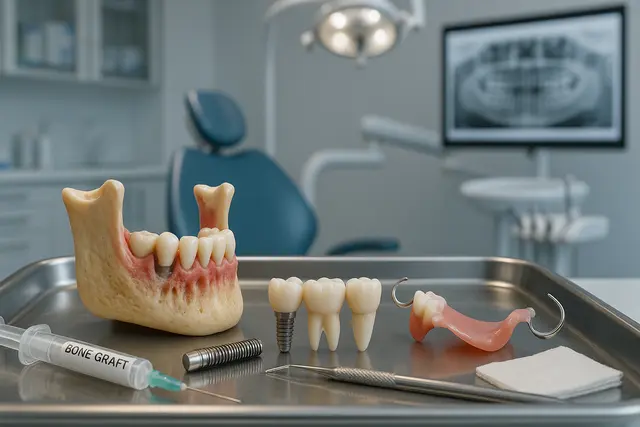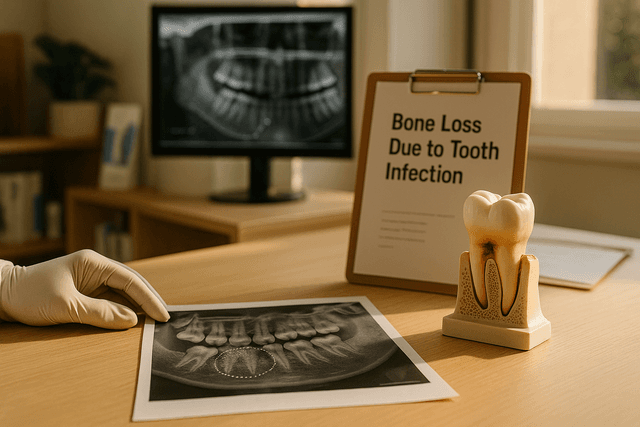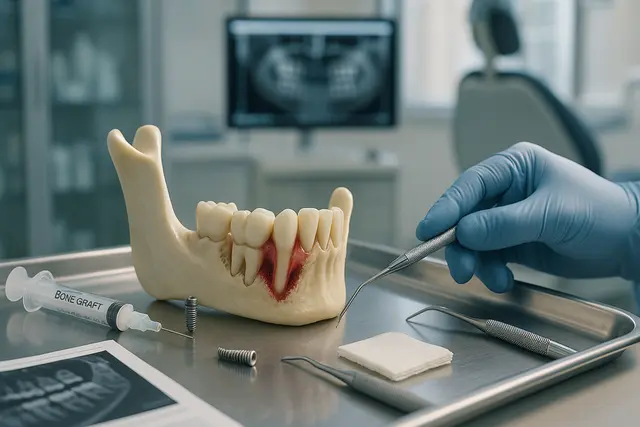Oral Health
5 min read
Jun 26, 2025
Is a Tooth Abscess Burst Dangerous? What You Need to Know
If you've ever felt a sharp ache in your tooth followed by a sudden pop and a nasty taste in your mouth, you might be dealing with a burst tooth abscess, and yes, that’s as serious as it sounds. While the pressure may seem to ease up, the real danger might just be getting started.

There’s nothing quite like that weird, salty taste in your mouth when something in your gums suddenly pops. One second, there’s pain, swelling, pressure. Then, relief? Maybe. But if you’ve had what’s called a burst abscess, the story doesn’t end with that little pop.
In fact, that could be when the real trouble begins. If you’ve experienced a dental abscess bursting, or suspect that’s what just happened, you’re in the right place. Let’s walk through what it means, why it matters, and what you should do next.
What Is an Abscess, and Why It’s More Than Just a Bump
An abscess is a pocket of pus caused by a bacterial infection. Think of it as your body’s way of trying to contain a nasty invader, except it builds up pressure until something’s got to give. That “something” is usually your gum tissue, and when the abscess ruptures, it leaks out into your mouth. Gross? Yes. Dangerous? Potentially.
There are different types of abscesses depending on where they form. A periapical abscess forms at the tip of the tooth root, often because of deep tooth decay, trauma, or a crack in your tooth. A periodontal abscess lives in the gum tissue around the tooth, often due to gum disease or poor dental care. Either way, both hurt. Both are serious. And both can get worse, fast, if left untreated.
Dental Abscesses and Why You Shouldn’t Wait
A dental abscess is more than just a painful inconvenience. It’s a sign that bacteria have made their way into places they definitely shouldn’t be, inside your tooth, down to the pulp, or deep in the gum. Once there, bacteria invade tissue, multiply, and trigger swelling, pressure, and pain.
And if the abscess bursts? That doesn’t mean the infection is gone. It just means the pus found an escape route. The infection can spread, sometimes beyond the teeth and gums to areas of your head, neck, or even into your bloodstream. We’re talking life-threatening condition levels if the infection spreads unchecked.
This isn’t to scare you (okay, maybe just a little), but it’s to underline how critical it is to get dental treatment even if the pain eases up for a bit. Don’t be fooled by that temporary relief. A burst abscess can still cause an infection to spread to your jaw, your sinuses, or worse.
If you’re looking for temporary relief in the meantime, here are some pain-free toothache remedies that may help while you wait for care.
When to See a Dentist After an Abscess Pops
If a gum abscess pops or you feel a sudden rush of foul-tasting fluid in your mouth, rinse your mouth gently with warm salt water. But then? See a dentist, quickly. That burst may have relieved the pressure, but it did not remove the remaining infection.
A dentist will examine the affected tooth, assess the damage, and possibly take X-rays to check if the infection has spread to the tip of the root or other areas of your head. Depending on the severity, your dentist may:
Prescribe antibiotics to control the infection
Recommend a root canal treatment to clean and seal the tooth root
Refer you to an oral surgeon if oral surgery or tooth extraction is necessary
In short, they’ll help save your tooth and protect your overall dental health.
Tooth Abscess Causes: What’s Going On Inside Your Mouth
A tooth abscess usually begins with tooth decay. A cavity that’s gone too far can breach the enamel and dentin layers, giving bacteria a path straight to the pulp. Once there, your body responds with inflammation and, eventually, pus buildup.
But abscess causes aren’t limited to cavities. Gum disease, trauma (like a blow to the mouth), and even poor oral hygiene habits can create opportunities for bacteria to sneak in. Once the abscess forms, the body tries to fight back, but without intervention, the infection may win.
And when that happens? The pressure builds until, well, you get a burst abscess and that unsettling taste in your mouth.
Abscess Treatment: What to Expect and How to Heal
The good news is, with the right abscess treatment, you can absolutely recover, and quickly. If the abscess is a pocket of pus, the priority is to drain it. But treatment doesn’t stop there. To truly heal and prevent further infection, your dentist will focus on removing the source.
That might include:
Root canal treatment to remove infected dental pulp and clean out the inside of your tooth
A deep periodontal cleaning if the infection started in the gum tissue
A tooth extraction if the infected tooth can’t be saved
In some advanced cases, emergency dental intervention or hospitalization for a serious infection
And yes, antibiotics help, but they aren’t a cure. They control the bacterial infection, but they don’t fix the underlying problem. That’s why professional dental care is non-negotiable here.
How to Prevent Dental Abscesses in the First Place
If you’ve had an abscess before, you already know it’s not an experience you want to repeat. So how do you prevent dental abscesses from forming again? Start with consistent, good oral hygiene.
Here’s your playbook:
Brush your teeth twice a day
Floss once daily to clean between teeth and under the gum line
Use an antiseptic rinse to reduce bacteria
Eat fewer sugary snacks and drinks that feed decay-causing bacteria
Visit your dentist regularly for checkups and cleanings. Not sure where to start? Learn how to choose a family dentist you can trust.
Address any dental problems (like a cavity or crack in your tooth) early
It’s not glamorous, but it works. Small daily habits play a big role in oral health, and skipping them can absolutely cause an abscess can lead to much bigger issues.
Final Thoughts: Don't Wait for a Burst to Act
Here’s the bottom line: a burst abscess might seem like it solved itself, but it hasn’t. It’s a red flag. Your body’s signaling that something is seriously wrong inside your mouth. Left untreated, it can spiral into complications that impact more than just your oral health. It can affect your overall wellbeing too.
So if you’re reading this after just feeling something warm and nasty in your mouth, or wondering why your gum is oozing and your face is a little swollen, schedule an appointment. Get ahead of it. Don’t wait for a full-blown crisis to get comprehensive dental care.
Because your teeth and gums deserve better than pus and pain, and you deserve to sleep, smile, and chew without worrying that your molar is plotting something awful.
What Should I Do Immediately After a Dental Abscess Bursts?
If an abscess bursts, rinse your mouth gently with warm salt water to clean the area and reduce bacteria. Do not assume the problem is resolved, see a dentist as soon as possible. The abscess may have drained, but the underlying infection remains and can still spread without treatment.
Is a Burst Abscess an Emergency?
Yes, it can be. A burst abscess may temporarily relieve pressure, but the infection can spread quickly to nearby tissues or even enter the bloodstream. If you experience facial swelling, fever, or difficulty swallowing or breathing, seek emergency dental or medical care immediately.
Can Antibiotics Alone Treat a Dental Abscess?
No, antibiotics help control the infection but do not eliminate the source. A dentist must drain the abscess and treat the root cause, sually through a root canal, deep cleaning, or in some cases, tooth extraction, to fully resolve the problem and prevent recurrence.
How Can I Prevent Dental Abscesses From Coming Back?
To prevent future abscesses, maintain excellent oral hygiene: brush twice daily, floss once a day, and use antiseptic mouthwash. Limit sugary foods and drinks, and visit your dentist regularly. Address cavities, cracks, or gum issues early to stop infections before they start.
Read Next
Related Posts

Oral Health
Tooth Replacement Options to Prevent Bone Loss
Losing a tooth isn’t just about appearance, it can have a lasting impact on your oral health, jawbone strength, and overall quality of life. When teeth go missing, the jawbone begins to shrink, which can change your bite, your facial structure, and even your confidence. Fortunately, modern dentistry offers several effective solutions to replace missing teeth and prevent further bone loss.
4 min read
Sep 26, 2025

Oral Health
Bone Loss Due to Tooth Infection Explained: What It Means for Your Oral Health
A tooth infection isn’t just about pain, it can quietly damage the tissues around a tooth and even erode the jawbone that supports your smile. This guide explains how infections start, why they can lead to bone loss, the warning signs to watch for, and the treatments that can stop the spread and rebuild lost support.
5 min read
Sep 25, 2025

Oral Health
Understanding Bone Loss in Teeth: Causes and Treatments That Work
Bone loss in teeth is a silent threat that can compromise your smile, facial structure, and overall oral health. While it often goes unnoticed in the early stages, it can lead to serious consequences if left untreated. Understanding what causes dental bone loss, and how to prevent or manage it, is key to maintaining a strong, healthy foundation for your teeth.
5 min read
Sep 25, 2025
Don’t have time to research every dentist around you?
See why 30k+ patients trusted us